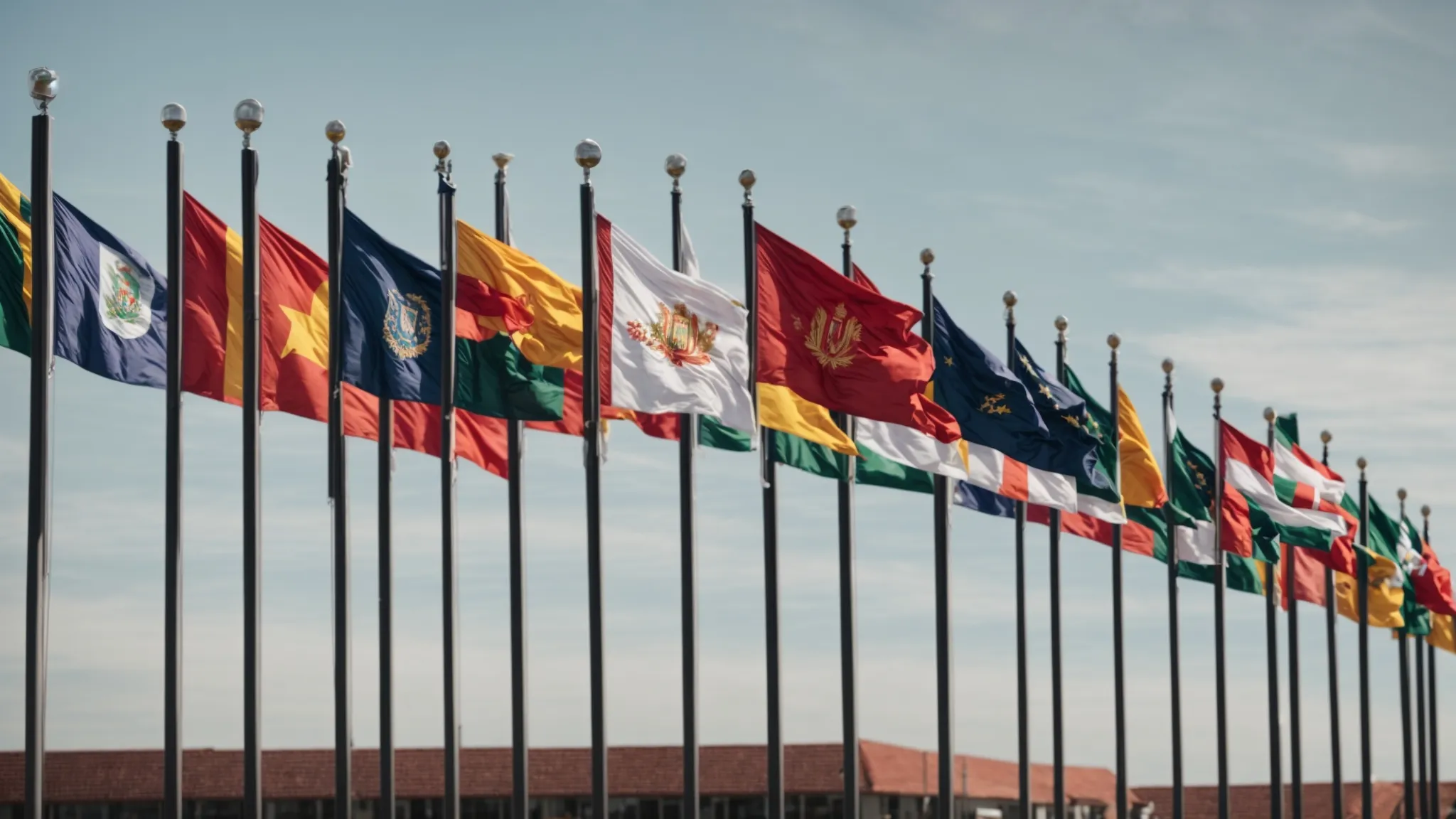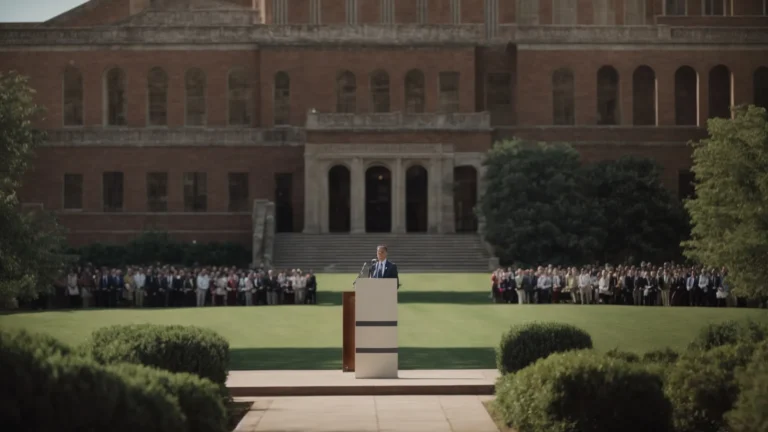The Impact of Education on Political Leadership and Policy Formation
The corridors of power are often lined with the portraits of leaders whose decisions shape our daily lives, yet behind every resolute face is a history of education that has honed their ability to lead and legislate.
From the ivy-clad towers of Ivy League universities to the dynamic lecture halls of public administration colleges, the journey through higher education has invariably served as a foundational platform for many politicians, informing their ideology, policy choices, and governance style.
It is not only their specific degrees—be it in law, political science, or economics—that influence their actions, but also the broader learning environment that nurtures critical thinking, debate and a deep understanding of societal dynamics.
As we peel back the layers of speeches and manifestos, we uncover the profound impact that academia has on the tapestry of politics and public policy.
In this article, we will explore the transformative role education plays in cultivating the leaders of today and tomorrow.
Key Takeaways
- Education Shapes the Ideologies and Policies of Political Leaders, Reflecting Their Academic Backgrounds
- Policy Decisions Often Mirror the Contours of Leaders’ Specialized Academic Training
- Interdisciplinary Education Fosters Innovation and Comprehensiveness in Policy-Making
- The Diversity of Educational Backgrounds in Administration Enhances the Crafting of Nuanced Policies
- The Rise in Technology and Science Degrees Among Leaders Signals a Shift Towards Data-Driven Governance
Tracing the Educational Pathways of Influential Leaders

In my exploration of the intricate web linking higher education and political influence, I found myself delving into the academic trajectories of world-renowned leaders.
The tapestry of their expertise, I discovered, is as diverse as the countries and constituities they serve, intriguingly reflecting their legislative agendas and governance styles.
As I sift through the annals of their formative years, patterns begin to emerge, revealing the undeniable imprint of their chosen fields of study on the public policies they champion.
From jurisprudence to business administration, the influence of academia on the political arena is both profound and palpable.
In the following discourse, I present rich case studies that exemplify this phenomenon, casting a spotlight on how the educational choices of these leaders not only shaped their professional journeys but also sculpted the legal and socioeconomic landscapes of their jurisdictions.
Exploring the Varied Academic Backgrounds of Global Leaders
In my relentless quest to understand the synergy between higher education and leadership, I’ve immersed myself in scrutinizing the educational foundations that underpin the careers of notable politicians. One case that illustrated this nexus was a politician who, with a Bachelor of Arts in Political Science from Princeton University, channeled her keen understanding of democracy and governance into transformative welfare policies – a testament to the salience of university education in shaping public roles.
Another leader’s journey through the corridors of a prominent public administration college illuminated his policy preferences, reflecting an academic background steeped in economics and social justice. It’s noteworthy that his curriculum, laden with theories of political economy and a strong emphasis on statistical evidence, seamlessly transitioned into a robust economic policy advocating for wealth redistribution and labor rights, echoing his academic lineage.
Moving eastwards, I encountered an Asian head of state whose university stints in Japan and the United States birthed an interdisciplinary expertise in technology and international trade. This potent mix of knowledge allowed for a rare innovation in trade policy, ultimately securing his country’s position as a global tech hub and exemplifying how diverse degrees can intersect to yield substantial geopolitical and economic influence.
The Correlation Between Field of Study and Policy Priorities
My research venture into the interplay of education and policy brings to light an intriguing correlation: the course of a leader’s career often mirrors the contours of their academic background. Take, for instance, a minister whose immersion in environmental protection disciplines arguably fuels their zeal for advancing green legislation. It suggests a nuanced link where scholarship informs, and perhaps ignites, the fervor for specific policy enactments.
Tangible policy shifts are reflective of the philosophical inclinations imbued during times in academia. This observation struck me while assessing a senator who paired a strong grounding in sociology with an unshakable commitment to combat income inequality. Here, academia doesn’t merely impart knowledge, but cultivates an ideology that later manifests through legislative undertakings aimed at bridging social class disparities.
Finally, another distinctive pattern surfaces when considering leaders with rich backgrounds in economics or business administration. Their academic pursuits lay the groundwork for policies that target economic growth and innovation, often coupled with strategic research investments. Such leaders demonstrate how deeply academia influences the crafting of fiscal initiatives, highlighting the power of educational foundations in guiding the economic destinies of nations.
Case Studies: How Specific Leaders’ Educations Influenced Their Careers
When I shifted my gaze to a renowned leader in environmental law, her trail from a college classroom in Ireland to the ministry’s high office became evident. Her rigorous academic focus on climate change legislation fueled her subsequent work leading to some of the most comprehensive environmental policies. This case vividly showcased how specialized higher education courses can forge pioneers in political sectors.
Another profound example came from the mayor of a bustling city in northern France, whose background in social psychology profoundly affected his approach to urban development. Aligned with his educational philosophy, his administration championed community-centric public policies that emphasized inclusivity and mental health, underlining the liaison between one’s studies manick bhan personal website and their impact on society.
Delving deeper, I became intrigued by the narrative of an entrepreneur-turned-politician from India, whose insurgence into politics seemed directly rooted in his vast experience in technology and business administration. Armed with a keen sense for market trends and an unparalleled understanding of economics from his university days, his legislative focus on innovation and entrepreneurship within the country sparked a significant uplift in the national economy:
- Initiated policies promoting technological education to foster innovation.
- Implemented tax incentives for startups, leading to an entrepreneurship boom.
- Launched governmental programs to attract foreign business investments.
How Higher Education Shapes Policy Development

My investigation into the nexus of higher education and policy-making leads me to consider the pivotal role that academic institutions play in the political sphere.
Higher education, I’ve found, equips future leaders with not just a repository of facts, but with the analytical prowess necessary to navigate the convoluted terrain of policy complexities.
It becomes ever clearer that universities act as incubators for political ideologies, shaping the intellectual milieus from which many politicians emerge.
These educators and mentors influence their students’ perspectives on governance, freedom, and reform, which are later carried into the corridors of power.
This transformative journey—from the meticulous analysis of public administration theories in lecture halls to the crafting of impactful legislation—underscores the symbiotic relationship between education and legislative practice.
It is this relationship that I aim to unravel, shedding light on how scholarly pursuits translate into the informed, strategic decision-making that guides nations.
The Role of Higher Education in Understanding Policy Complexities
In my ongoing exploration of the political tapestry, it is increasingly apparent to me that higher education institutions play an indispensable role in deciphering the complex interplay between public policy and societal needs. These educational powerhouses are arenas for vigorous debate, fostering an environment where the seeds of governance and ethical decision-making are cultivated through critical thinking and evidence-based research.
The rigorous training provided by bachelor’s and advanced degrees equips future leaders with the multidimensional skill set critical for understanding and managing the policy intricacies inherent in the governance of modern democracies. In my own experience, the depth of analysis required in university coursework directly parallels the granular scrutiny necessary for effective policy evaluation and formation.
This journey of intellectual rigor fosters a robust comprehension of the underpinnings of political systems and their socioeconomic impacts, enabling graduates to adeptly navigate the labyrinth of legislative challenges they will encounter as policymakers:
- Disciplined evaluation of historical and contemporary socio-political data informs policy decisions.
- Academic exposure to case studies of economic policy highlights the interconnectedness of global markets.
- Theoretical frameworks studied in depth provide a foundation for crafting sustainable and equitable legislation.
Universities as Breeding Grounds for Political Ideologies
During my immersive ventures into the scholarly world, I’ve come to recognize the corridors of academia as a forceful crucible for political thought. Universities, brimming with intellectual debate and cultural discourse, have proven to be fertile grounds where future policymakers and leaders cut their teeth on the ideologies that will shape their approach to governance. It is within these halls that the ideologies of liberalism, conservatism, and socialism, among others, are dissected, debated, and internalized by the next generation of political actors.
In my interactions with academia across continents—from the hallowed grounds of North America to the vibrant universities of Asia—I’ve witnessed firsthand how these institutions instill in their cadres of students a nuanced understanding of political philosophies. This education goes beyond mere rote learning; it is an initiation into a world of ideological frameworks that challenge, refine, and sometimes radically alter the belief systems students bring to the classroom.
As I reflect on my conversations with educators, it becomes undeniably clear that universities are not just passive conveyors of existing knowledge, but dynamic entities that contribute to the shaping of political thought. Faculties steeped in decades of research and passionate about their disciplines actively encourage a spirit of inquiry that often translates into the ideological leanings of students, subsequently reflected in their public and political careers. Universities thus play a pivotal role in crafting the very lens through which graduates will view, interpret, and influence the political landscape.
From Lecture Halls to Legislative Halls: The Journey of Policy Formation
The corridors of a university spark not only the quest for understanding but also the shaping of leaders who will one day craft the policies governing our societies. I have observed the transformation of abstract theories into concrete political strategies that address real-world problems. This journey from academia to action demonstrates the profound effect that an education can have on forming the practical approaches and strategies that guide political decision-making.
During my own tenure at a higher education institution, I honed the ability to dissect and construct arguments, a skill which later became instrumental in developing policy proposals. The critical thinking fostered within university walls engendered an adeptness for navigating complex political, social, and economic terrains:
- Classroom discussions shed light on the nuances of policy implications and societal impact.
- Interdisciplinary research equipped me with a broader perspective on the multifaceted nature of policy challenges.
- Capstone projects simulated the processes of policy creation, amendment, and implementation, offering a microcosm of the political process.
It was in these academic settings, rich with debate and analysis, that I and many of my colleagues developed the foundational ethos that would guide our public service. The policies we later pursued were invariably colored by the values and knowledge acquired during our educational journey: formulating strategies rooted in evidence, pursuing justice grounded in philosophy, and seeking innovation inspired by technology and entrepreneurship that had once captivated us in our studies.
Educational Institutions as Catalysts for Political Change

Throughout history, educational institutions have served not only as centers of learning but as potent fulcrums of societal change.
The intellectual currents that flow through the classrooms have frequently spilled over into the political arena, precipitating movements and inspiring the formulation of policies with profound societal implications.
As I reflect upon the historic examples of educational influence on political movements, I am drawn to the indelible mark left by educational reforms on the political landscapes they intersect with.
My analysis is grounded in an unwavering conviction that educational policy is inextricably linked to societal shifts, acting as a blueprint for the development of informed, progressive communities.
In what follows, we unravel these connections and their ripple effects across the tapestry of society.
Historic Examples of Educational Influence on Political Movements
Navigating through the corridors of history, I’ve observed how educational reforms have sparked significant social and political change. The Enlightenment era, for instance, saw universities becoming hotbeds of philosophical thought that challenged the established socio-political order and catalyzed the advent of democracy in the West.
Recalling the fervor of the 1960s, it’s impossible to overlook the role that campuses played in the civil rights and anti-war movements. Universities across the United States became the epicenter of activism, where informed dialogue ignited a generation’s struggle for justice and peace, reshaping the political discourse of the era.
The recent surge of student-led movements for climate justice provides a contemporary illustration of education’s power to drive political action: students are translating their academic knowledge into global campaigns, influencing policy on environmental issues. This phenomenon underscores the ability of higher education to not only foster critical thinking but to empower direct political engagement:
- Students from across the globe are collaborating on research and advocacy.
- Academic conferences on climate change are spawning grassroots movements.
- Educational initiatives are engaging policymakers in sustainable practices.
Analyzing the Impact of Educational Reforms on Political Landscapes
As I delve deeper into how educational reforms shape political landscapes, the breadth of their impact becomes apparent. Reforms such as the Bologna Process in Europe, which standardized degrees across the continent, have facilitated greater mobility for students and academics, potentially diversifying the political landscape by exposing future leaders to a broader range of ideas and cultures.
Conversely, movements advocating for open access to literature and research equip a wider audience with the scientific evidence and theoretical frameworks needed to engage authoritatively in political debate. Such initiatives break down the barriers of knowledge that have traditionally upheld the elite echelons of political discourse and policy-making:
| Educational Reform | Political Impact |
|---|---|
| Standardization of Degrees (Bologna Process) | Enhanced cultural exchange and cross-border policy collaboration |
| Open Access Movements | Democratization of knowledge leading to more inclusive political engagement |
In my assessment of educational reforms and their ripple effects, the drive for curriculum diversification stands out for its capability to mould future policymakers’ worldviews. By integrating global perspectives and non-Western philosophies into higher education curricula, these reforms broaden the intellectual horizons of students, preparing them for leadership roles that are increasingly defined by an interdependent world.
The Connection Between Educational Policy and Societal Shifts
My assessment of the link between educational policy and societal transformation is replete with examples where shifts in educational paradigms have precipitated pivotal societal changes. I’ve noticed that when educational policy prioritizes accessibility and quality, it can be a powerful equalizer, facilitating upward mobility and fostering a more informed and engaged citizenry, thus paving the way for social progress and stability.
Reflecting on the broader impact, I’ve observed how updated curriculums that embrace contemporary issues like human rights, climate science, and digital literacy can prepare students to meet the demands of an evolving political landscape. Policies that foster such forward-thinking education instill in learners the critical thinking skills and ethical considerations needed to grapple with complex modern challenges, planting seeds for future policy innovation.
In my interaction with educational reformers, I’ve been struck by the notion that integrative policies, which break down the silos between disciplines, can lead to interdisciplinary approaches in problem-solving, ultimately influencing the formulation of robust and nuanced public policies. Ensuring education systems mirror the interconnectivity of global issues encourages graduates who can transcend traditional boundaries in policymaking, culminating in societal shifts towards greater collaboration and comprehensive understanding.
The Influence of Specialized Studies on Political Strategies

Delving into the realm of specialized studies and their consequent influence on policy, I often astound myself with the magnitude of their ripple effects on political strategies.
As I trace the contours of leaders’ educational backgrounds, a clearer vista surfaces—a vista where deep dives into economics mold the very framework of fiscal policies, where the rigorous discipline of law school fosters legal reforms and just policies, and where the nuances of environmental studies germinate into forward-thinking, green legislation.
These specialized areas of study do not exist in isolation; rather, they coalesce through the lives of policy-makers to meticulously sculpt the landscapes of governance and social welfare they navigate and transform.
How Studies in Economics Shape Fiscal Policies
My ongoing analysis of political leaders with a background in economics has revealed a direct influence on their approach to devising fiscal policies. These leaders tend to advocate for pragmatic budget strategies, grounded in empirical data analysis and economic theories, which aim to stabilize and stimulate their national economies.
Drawing from their in-depth study of economic principles, leaders are better positioned to identify the core factors that drive inflation, unemployment, and economic growth. Their education empowers them to craft policies that navigate complex financial landscapes, striving to balance the books while fostering inclusive prosperity.
Furthermore, an education in economics instills a critical understanding of market dynamics, enabling politicians to anticipate and mitigate financial crises. Their policies often reflect a sophisticated grasp of international finance, trade, and investment flows, ensuring their governance strategies align with the broader global economic context.
The Impact of Law Degrees on Legal Reforms and Justice Policies
In my scrutiny of the political sphere, I have consistently observed how law degrees serve as a crucible for forging the bedrock of legal reforms and justice policies. Politicians with a background in law bring a meticulous understanding of legal frameworks, which underpins their propensity to instigate pivotal legislation and reforms—be it in civil liberties, criminal justice, or corporate regulation.
Their education equips them with a profound respect for the rule of law, and this translates into a steadfast commitment to the principles of equity and justice within the policies they champion. This nexus between legal studies and policy outputs underscores the value of a law-focused education in cultivating leaders who can navigate the intricacies of legislation with both skill and foresight, steadfast in their goal to strengthen democratic institutions and society’s legal underpinnings.
Moreover, having grappled with the rigors of the legal system, these leaders often emerge as ardent advocates for judicial independence and procedural fairness. Their legislative actions frequently reveal a nuanced approach to balancing the scales of justice, underscoring the intrinsic influence of their legal education in shaping a more just and equitable political landscape.
Environmental Studies Influencing Sustainable and Green Policies
My foray into the study of environmental policy has illuminated how education in environmental studies equips political leaders with the insights and prerogatives to enact sustainable and green policies. Armed with knowledge about ecosystem dynamics, conservation methods, and climate science, they bring urgency and expertise to the policymaking process, positioning environmental stewardship at the forefront of their legislative priorities.
Leaders educated in environmental studies often advocate for policies that align economic development with ecological sustainability. Recognizing the intricate balance between human activity and environmental health, they work to integrate green technologies and renewable energy solutions into the economic framework, shifting the narrative towards a sustainable future.
| Leadership Education | Policy Emphasis |
|---|---|
| Environmental Studies | Legislation on climate action and conservation |
| Sustainable Development | Economic policies incorporating green technology |
| Ecology and Conservation | Protection of biodiversity and natural resources |
The relentless pursuit of environmental protection led by these educated leaders often results in transformative policy actions: from the implementation of stringent emissions standards to the championing of international agreements on biodiversity. Their specialized studies lay the groundwork for an unwavering commitment to the global challenge of mitigating climate change and preserving the planet for future generations.
The Diverse Educational Backgrounds Within a Single Administration

As I venture deeper into the high-stakes world of political stratagems and leadership, I’ve become intrigued by the diverse mosaic of educational experiences present within a single administration.
Analyzing the current composition of government cabinets and advisory teams, it’s apparent how a multitude of educational pathways converge to influence policy creation.
From economists to environmental scientists, the spectrum of insights brought to the table by officials with disparate academic backgrounds facilitates a richer, more holistic approach to legislative affairs.
The ensuing discourse will dissect how this diversity fosters collaborative policy formation, explore the challenges of reaching consensus amidst varying educational views, and highlight the considerable advantages these differences can wield in crafting nuanced public policy.
Case Analysis: The Educational Diversity of Current Administrations
In my analysis of the current political scene, I cannot help but marvel at the rich tapestry of educational backgrounds that make up a single administration. The presence of individuals with degrees ranging from environmental science to political economy leads to a stimulating fusion of perspectives, laying the groundwork for well-rounded and innovative policy decisions.
Observing the interactions in policy meetings, it becomes evident how the educational diversity within these circles champions a culture of robust debate and collaborative synthesis. The dialogue among cabinet members, each leaning on their area of study, ensures policies are not just a reflection of collective wisdom but also attest to the depth and breadth of specialization guiding their decisions.
Throughout my professional journey, I’ve witnessed firsthand how educational pluralism within an administration enhances its ability to confront the multifaceted challenges of governance. Economists, social scientists, and legal experts bring to the table a dynamic spectrum of insights, which, when intertwined, generate policy outcomes that are not just effective, but are also reflective of the complexities of the society they govern.
Collaborative Policy Formation: The Benefit of Multidisciplinary Teams
In my extensive experience observing policy-making processes, I’ve come to the conclusion that the most effective teams are those that encompass a wide array of educational expertise. These teams harness their diversified skill sets to create robust policies that can withstand the scrutiny of varied academic lenses and, crucially, the multifarious demands of public interests.
Through my interactions with public administrators and policy strategists, it’s become abundantly clear that multidisciplinary teams facilitate a profound level of collaborative innovation. They cultivate a breeding ground for breakthrough ideas, where legal minds mesh with economists and environmentalists, each infusing policy drafts with their distinct, academically informed insights.
The benefit of multidisciplinary teams extends to the calibration of policy mechanisms, allowing for fine-tuning that can only result from the interchange between different fields of expertise. My observation has confirmed that this confluence of knowledge sources invariably leads to more comprehensive and adaptable public policies, reflecting the rich educational palette of their architects.
Challenges and Advantages in Policy Consensus With Diverse Educational Insights
Reaching consensus within a diverse administration presents a unique set of challenges. Individuals with varied academic experiences can possess conflicting viewpoints that stem from their specialized areas of training, potentially leading to friction in policy deliberations. The process of negotiating across these educational divides demands patience and the ability to appreciate the value of differing perspectives.
The advantages of such diversity, however, become clear when interdisciplinary insights lead to policies of greater depth and sophistication. Table discussions enriched by a spectrum of academic experiences yield comprehensive strategies that better address complex societal needs. The synergetic force of diverse educational insights often catapults policy formulation to higher echelons of efficacy and innovation:
| Educational Background | Policy Insight |
|---|---|
| Economics | Fiscal prudence and growth-centric approaches |
| Law | Regulatory frameworks and justice-driven reforms |
| Environmental Science | Sustainable practices and conservation measures |
A critical consideration is ensuring that each voice contributes constructively to policy consensus, fostering a climate of mutual respect and shared goals. My role often involves mediating these discussions to encourage a focus on common objectives, using our collective depth of knowledge to navigate the political landscape adeptly for the greater public good.
Future Trends: The Evolving Educational Profiles of Political Leaders

As we peer into the horizon of political leadership and policy formation, the educational underpinnings of our future leaders serve as a compass guiding the direction of change.
Anticipating these shifts, I contemplate emerging trends that signal a transformation in the educational landscape of political figureheads.
The burgeoning influence of technology and science degrees within the political realm prompts a fascinating pivot in policy-making perspectives, promising an era where evidence-based strategies and innovative solutions take precedence.
Equipped with an educational arsenal that leverages the breadth of human ingenuity, leaders are setting the stage for inclusive and comprehensive policy development, ensuring that the needs of an evolving society are met with adeptness and vision.
Predicting Changes in Political Leadership’s Educational Trends
As I project into the future, I see an educational landscape that promises to transform the fabric of political leadership. With a surge in the importance of technology and data science, I anticipate an influx of leaders whose backgrounds in these fields drive policies grounded in analytics and digital innovation. The infusion of such expertise into politics suggests a forthcoming era where data-driven decision-making becomes an intrinsic part of governance, influencing everything from economic strategies to national security protocols.
- An increase in political leaders with strong technology and artificial intelligence backgrounds, leading to more tech-centric policies.
- The rise of interdisciplinary degrees, blending public administration with emerging sciences, ensuring well-rounded policy approaches.
- The integration of global education experiences, promoting a more nuanced understanding of international relations and cultural dynamics in policy-making.
The relentless expansion of global interconnectedness and multicultural exchange is likely to foster leaders with a more eclectic international education. Their global perspectives will be pivotal in shaping policies that recognize the interdependence of nations, addressing cross-border issues like climate change and international trade with a richer, more informed approach.
Lastly, I foresee the traditional path to political ascendancy through legal and economic studies being complemented by degrees in social entrepreneurship and environmental sustainability. As the public discourse amplifies the urgent need for holistic change, future political figures with this educational diversity will be instrumental in weaving social justice and ecological concerns into the very fabric of policy initiatives.
The Rise of Technology and Science Degrees Among Political Leaders
In my observations of the political landscape, the ascent of political leaders with backgrounds in technology and science heralds a pivotal shift. This cohort brings a systematic and empirical approach to governance, laying the groundwork for informed and innovation-driven policy decisions that resonate deeply with a rapidly changing world.
The tech-savvy lawmakers, armed with an intimate knowledge of software development, artificial intelligence, and cybersecurity, are reshaping the international discourse on matters ranging from national defense to intellectual property laws. Their expertise fosters a forward-looking agenda that is acutely responsive to the burgeoning technological demands of the 21st-century populace.
As we transition into an era where environmental challenges loom large, the significance of science degrees, particularly in renewable energy and climate science, cannot be overstated among political ranks. Leaders with these credentials are indispensable, as they are equipped to champion evidence-based environmental policies, ensuring sustainability measures are deeply integrated into the broader socio-economic framework.
Education as a Tool for Inclusive and Holistic Policy Formation
As a proponent of robust public policy, I recognize that an educational framework encompassing diverse disciplines is paramount for the formulation of inclusive and comprehensive strategies. Education equips leaders with an appreciation for the myriad dimensions of societal issues, allowing them to craft policies that cater to a spectrum of needs and preferences.
The incorporation of ethics and social responsibility into curricula has empowered political leaders to adopt a holistic approach to policy-making. With knowledge that transcends traditional boundaries, these leaders are uniquely positioned to address the complex interplay between economic viability, social equity, and environmental stewardship:
- Education in ethics informs policies that prioritize fairness and moral responsibility.
- Training in social sciences fosters sensitivity towards cultural and community dynamics.
- Environmental sustainability studies shape strategies that balance development with conservation efforts.
In recognition of the shifting demographic and global landscapes, educational experiences focused on inclusivity propel policymakers to design frameworks that reflect the diversity of their constituencies. Such leaders utilize education as a tool not only for personal advancement but as a means to acknowledge and celebrate the rich tapestry of the global community in their policy initiatives.
Conclusion
The academic journeys of political leaders undeniably shape the public policies they enact, with specialized studies in fields like economics, law, and environmental science directly influencing fiscal decisions, legal reforms, and sustainability measures.
Multidisciplinary educational backgrounds within administrations enrich policy formation, fostering collaborative approaches that navigate the complexities of modern governance.
As emerging trends lean towards political figures with technological and scientific expertise, data-driven and innovation-oriented policies are set to rise, addressing the demands of a rapidly evolving society.
Ultimately, education empowers leaders to draft comprehensive, evidence-based strategies that integrate ethical, economic, and environmental considerations for inclusive and effective policymaking.






